U.S. President Donald Trump has asked officials to give him options for removing the threat of a nuclear-armed North Korea, National Security Adviser H.R. McMaster said Sunday.
As a U.S. Navy strike group steamed toward the Korean Peninsula to send a message to North Korea, McMaster told Fox News, “This is a rogue regime that is now a nuclear-capable regime. … So, the president has asked us to be prepared to give him a full range of options to remove that threat to the American people and our allies and partners in that region.”
McMaster described the U.S. decision to send the Carl Vinson Strike Group to safeguard U.S. interests in the Western Pacific as “prudent.” He said that Trump and Chinese President Xi Jinping agreed at their summit in Florida last week that Pyongyang’s “provocative behavior” developing nuclear weapons was unacceptable.
“Presidents before and President Trump agreed this is unacceptable, that what must happen is the denuclearization of the peninsula,” McMaster said.
North Korea has been trying to develop a long-range missile carrying a nuclear warhead that is capable of hitting the U.S. mainland, a distance of about 8,000 kilometers. It has staged five nuclear tests so far and could be preparing a sixth.
North Korea last week conducted a ballistic missile test in spite of U.N. Security Council resolutions banning such launches.
U.S. Secretary of State Rex Tillerson, without directly naming North Korea, told ABC News, “If you violate international agreements, if you fail to live up to commitments, if you become a threat to others, at some point a response is likely to be undertaken.”
The Carl Vinson Strike Group was making a port call in Singapore and was scheduled to sail for Australia when the U.S. Pacific Command ordered the ships to sail north instead.
“Third Fleet ships operate forward with a purpose: to safeguard U.S. interests in the Western Pacific,” Commander Dave Benham, Director of Media Operations for the U.S. Pacific Command Third Fleet, told VOA.
“The number one threat in the region continues to be North Korea, due to its reckless, irresponsible, and destabilizing program of missile tests and pursuit of a nuclear weapons capability,” Benham said.
The strike group includes its namesake aircraft carrier, the USS Carl Vinson, as well as three guided-missile destroyers.
Pyongyang’s reaction
Pyongyang has repeatedly defied international warnings about conducting missile launches and testing nuclear devices.
On Sunday, a North Korean Foreign Ministry official was quoted on state-run media as vowing to step up the country’s defenses to protect itself from airstrikes like the U.S. carried out against Syria last week.
The unidentified official told the Korean Central New Agency the airstrikes were “absolutely unpardonable,” and proves Pyongyang is justified in having nuclear weapons.
While Trump has not set out a clear strategy for dealing with the isolated nation, he has criticized the administration of former President Barack Obama for its policy of “strategic patience,” in the face of North Korea’s ongoing efforts to develop long-range nuclear strike capability. Trump has also called on China, North Korea’s strongest ally, to take stronger action to curb those nuclear ambitions.
Unilateral action?
Earlier this month, Trump suggested the U.S. might take action unilaterally if China wasn’t willing to do more.
“If China is not going to solve North Korea, we will,” Trump told The Financial Times on April 2. “China will either decide to help us with North Korea or they won’t. If they do, that will be very good for China, and if they don’t, it won’t be good for anyone.”
Tillerson said that Xi, at his summit with Trump, signaled a willingness to do more to rein in North Korea.
“They have indicated that they will and I think we need to allow them time to take actions,” Tillerson said of China.











